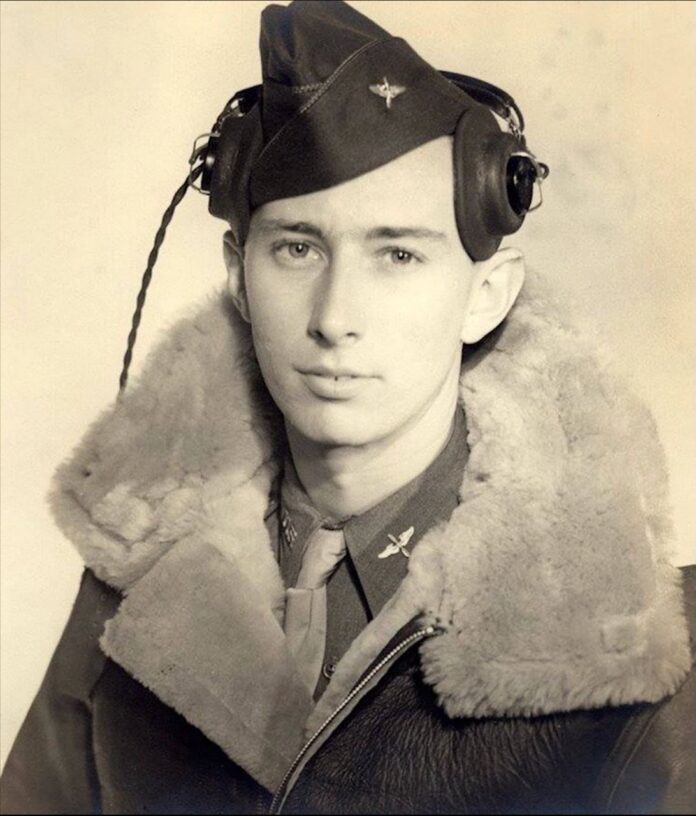Just this past week, I was offered the opportunity to co-interview John “Lucky” Luckadoo, the only surviving member of the “Bloody Hundredth” Bomb Group from World War II. “The Bloody Hundredth” was a name given to the notorious and storied 100th Bomb Group of the Eighth Air Force in World War II because they suffered such staggering numbers of casualties in a short period of time. Lucky is also a main subject of “The Bloody Hundredth” documentary, “Masters of the Air,” a series by Steven Spielberg and Tom Hanks, and the “Damn Lucky” biography.
Not too long after I was released early from my last-period class and walked into the Terry Center the next day did I realize Lucky wasn’t just exceptional for his heroism, perseverance, and bravery in World War II. This centenarian who is part of an elite club representing about .0004% of the world’s population not only managed to make it to 102 years old, but he quickly made it clear he didn’t need me nor anyone else to help him tell his story. After a prayer and short introduction, Mr. Luckadoo walked to the front of the room to join Noah McGough and myself at a table. We had pulled up a large, comfortable chair for our guest of honor, but he quickly declined it and proceeded to stand and speak without interruption for about 45 minutes. He joked that he was “happy to be here. . . happy to be anywhere, actually.” His sharp wit, recollection of a large range of details, and ability to stay on track and maintain his train of thought were better than most people half, if not a quarter of his age. Most of the boys in the audience were just a few years younger than he was when he was forced to immediately mature, grow up, and exhibit leadership and faith in his destiny in order to persevere and prevail through one of the most awful times in history.
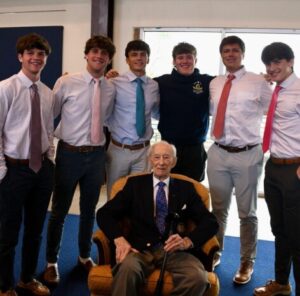
Journey to the Military
Lucky shared that as a boy he grew up on Missionary Ridge in Chattanooga, Tennessee with dreams of going to West Point. He joined the ROTC in high school and the commander of the regiment of the cadet corps was his best friend, Sully.
In December of 1941, the attack on Pearl Harbor completely changed the course of his life. He and his college fraternity brothers left college and went to the recruiting station to enlist, just hairy-headed kids who were thrust into battle to protect the United States against all enemies. At that time, if young men volunteered to join the military rather than waiting to be drafted, they could choose the branch they wanted to join. Believing the pilots to be cooler and more honorable than foot soldiers, he decided to join the Aviation Cadets of the Army Air Force (the Air Force was not a separate branch until after WWII in 1947). He was originally told to wait until he was needed, but soon got called up, stationed at Maxwell Base in Montgomery, Alabama. The week before this interview, Lucky had actually returned to speak at Maxwell for the first time since his time as an aviation cadet.
After graduating from flight training in 1943, he was immediately sent to be a copilot with 40 other classmates for the 100th Bomb Group. According to Mr. Luckadoo, it was very unusual to take graduates and immediately put them in a copilot role, and also how the 100th Bomb Group was the only bomb group to be ordered to do this. He said this process was worthy of mention because, as barely educated graduates were put into the copilot’s seat, therefore second in command of the ten-man crew, it weakened the bomb group due to inexperience. Because of this weakness, the 100th bomb group became infamous not only for its heavy losses, but also for the way it lost so many men in extremely devastating battles. Before being sent off to England to join the war, Lucky’s commander said to the group, “Look to the left of you and look to the right of you and only one of you is gonna come home, so you’re gonna get killed and you might as well accept it.” As he tells the story, Lucky pauses to dramatically portray the shock and horror with gif-like humor, then jokes, “What a great way to go to war this is!” There were uncomfortable laughs as the audience wrestled with the emotions and images his words conjured up; images so distant and foreign to the 2024 world we experience in Dallas as youth of roughly the same age he was at that time.
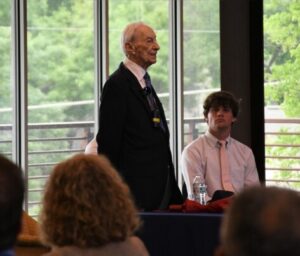
Battles and Conditions
Immediately after arriving at Thorpes Abbott, the young pilots were put into action in planes most had never even flown. Lucky ended up completing 25 missions while there. He recalled one of the most intense battles he experienced, saying that anti-aircraft fire was an extremely destructive force against the American planes and the German Luftwaffe allowed the flak to destroy American planes before attacking, but in this battle, the Germans were so desperate that they were flying through their own flak to attack the American planes. The young pilots suffered from the American commitment to daylight bombing. British commanders had been begging for American planes to abandon daylight bombing and join them in nighttime bombing, but America continued on with daylight bombing, increasing loss and suffering. Daylight bombing increased losses significantly and both the Germans and Britain did not expect America to be able to sustain the losses. Because America’s homeland was not directly suffering from the war, men and supplies were able to be supplied at a significantly greater rate than Britain and Germany.
The technology the American pilots used was extremely primitive, which also contributed to the massive losses. The planes were unfit for the high altitudes at which they flew, mostly because of the unpressurized design that did little to help the cold at such heights. Although America boasted about the state-of-the-art Norden bombsight, Lucky joked that it was little help in accurate bombing and if you hit your target, it was an accident. He said that 75% of the time they didn’t come within nine miles of their target. Because they missed more than they hit, they had to keep coming back until they finally hit their targets, increasing the number of battles and therefore increasing the number of casualties.
The skilled speaker that he is, Lucky neatly outlined four main adversaries that the pilots combatted while flying. All conveniently beginning with the letter “F,” these points help us to understand the constant duress and suffering Lucky and his fellow pilots endured:
- Freezing cold – the pilots flew in temperatures of 50 to 60 degrees below zero with unpressured planes. Lucky matter-of-factly stated, “If you took your glove off, your finger would simply self-amputate without any blood or pain.” They wore all of the clothes they had, including sheepskin and heated underwear, but it was just not enough to keep them from suffering. This lead to many of the pilots suffering from frostbite.
- Flak – the anti-aircraft fire was a major problem for the American planes, 80mm. cannons making it disastrous. Half of the losses of the Bloody Hundredth came from battling the flak.
- Fear – fighting a well-trained army who had been fighting for three years on two different fronts was extremely intimidating. Their enemies knew what they were doing and would fly directly into the American formations at 500 mph., giving themselves four seconds to rip through the American formations, an effective and intimidating strategy. Lucky said he’s frequently asked, “How did you do it Lucky?” to which he replies that he doesn’t really know, it was just what his job was. He said that although, sadly, his time could not diplomatically resolve their issues without armed conflict, they did what they had to do as young kids thrown into battle, pushing and testing the limits of what they could and could not do.
- Fighters – the enemy fighters outmatched the slow bombers and were heavily destructive to the American squadrons.
As he continued to share some of his battle experiences in great detail, the centenarian described the fact that, though the American bombers were supposed to be escorted by fighter jets, the flawed strategy did not consider that the fighters were twice as fast as the bombers. The fighters would have to circle the bombers, wasting fuel and then having to return to base before the bombers. On paper, the idea of another squadron of fighters seamlessly replacing the first group to avoid extended periods of the bombers being exposed worked beautifully, but in practice, it fell apart and was a far more challenging task in the endless skies. The bombers ended up having to self-protect themselves most of the time and Lucky bantered that the heavily armed bombers, nicknamed “Flying Fortresses,” should be able to take care of themselves. Still, the Germans proved that they weren’t quite as impenetrable as the pilot had hoped. In formation, the bombers were able to work to protect themselves, but once they were hit and wounded, American planes were singled out by the German fighters who quickly annihilated the helpless bombers. Mr. Luckadoo proactively answered a question in many of our minds, “How did he survive such seemingly insurmountable odds?” Fittingly, he attributes much of it to luck, like in his name. He says he is one of the luckiest men alive, and that he must have had a guardian angel on both shoulders.
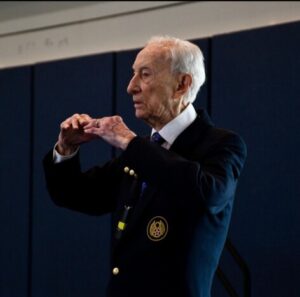
Coming Home from the War
After completing 25 missions, Lucky completed his duty and thought he was ready to come home, but he quickly realized that his life would never be the same and that “home” felt different. Like many soldiers who came home from the war in those years, he failed to recognize that he was suffering from PTSD, back then called “combat fatigue.” He and other soldiers were deeply appreciative of the incredible civilian support but felt ill at ease that the war was continuing on while they were home. In a previous interview, Lucky described a feeling of purposelessness that he felt when he was done with his missions. He not only no longer had a mission, he didn’t have a job. He longed for something to do, something to occupy his body and his mind. Eventually, he became an instructor at a flight school and stated jokingly that he wished he had gotten that teaching before the war, not after! His time at flight school still proved to be valuable, however, because this is where he happened to meet his future wife of 71 years.
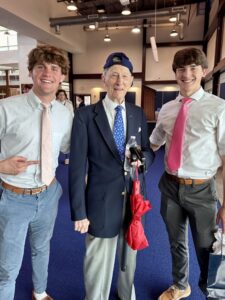
Impact and Meaning for us Today
Lucky at one point said, “You always wonder exactly why you were spared, but I do feel that it is my obligation to try to relate to successive generations, as best I can, something of what it was like to be called upon to serve your country and to put your life on the line in order to sustain and preserve our freedoms because they’re so precious to us.” What an honor it was to listen to him relate that to us, and to be in the presence of someone who has given so much of his life for the benefit of others; this is truly a shining example of “a man for others,” as in the motto of Jesuit.
So what do we, as one of those successive generations, take from listening to this incredible story that feels so unbelievable and unimaginable yet oddly somewhat familiar? Lucky’s depiction of the atrocities of war only begin to scratch the surface of the atrocities of war, but were there any positives that came from them? How can we honor those who came before us by turning their sacrifice into immortal gain?
The answers to these questions may seem complicated, but not impossible. Lucky said that during WWII, the whole attitude of the country was changed, and the entire population poured out their effort and patriotism to support the war efforts. Despite some of his peers’ beliefs, Lucky refuses to believe that the young generations are unable to step up in the way his generation did. He does, however, feel that today we are being betrayed from within, a sorry commentary on the sacrifices that his generation made so that we can enjoy the freedoms we do today. As Lucky experienced firsthand, freedom is not free. It is constantly under attack, so he implored our generation to be vigilant, vote, and be very grateful that God gave us a new day. It’s through those actions, coming from a heart full of appreciation and gratitude, that we ensure that the sacrifices Lucky and the many, many people before us made are not in vain.
Tune into The Roundup for more guest speaker interviews and profiles!


